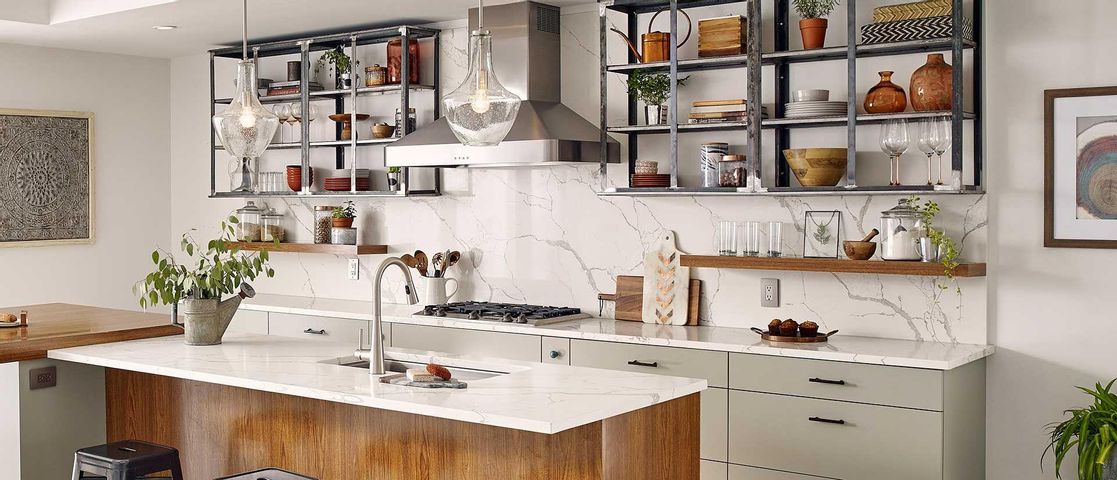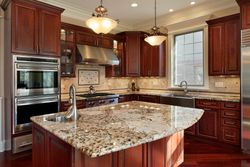What Is the Difference Between Marble, Granite, & Quartz?

There are many factors to consider when choosing a countertop. The right countertop should work well with your existing decor, provide utility, and fit your budget. However, there are many options to choose from and making a choice can become confusing. If you’re trying to decide between marble, granite, or quartz countertops, below is information about each to help you make the right decision.
Marble
Marble is a popular choice for countertops because of its unique, natural patterns and the variety it offers in terms of color and style.
Marble is a metamorphic rock formed when limestone is exposed to high temperatures and pressures. Marble forms under such conditions because the calcite forming the limestone recrystallises forming a denser rock consisting of roughly equigranular calcite crystals. Marble is found in various places around the world including India, Greece, Spain, Turkey and Italy.
Marble is one of the more porous stones, so you have to protect the surface by keeping it well sealed. Applying a penetrating sealant is simple. Make sure the surface is clean and dry and just wipe the sealant on with a soft cloth. Under normal use, the sealant should last about a year before it needs to be reapplied so long as you aren’t using harsh cleansers on your countertop. You’ll know it’s time for more sealant when you no longer see water drops beading on the surface. Stains aren’t the only things you have to be concerned about with marble. Marble is also prone to what’s called etching—that is, dull marks on the surface caused by contact with acidic substances. You’d be surprised how many cooking ingredients are acidic—lemon juice, vinegar, tomato sauce; the list goes on. Because marble is comprised mostly of calcite, it can have adverse reactions to acid. If you spill vinegar or lemon juice on a marble surface, for example, the acid in these products can eat away at that surface and leave unsightly white marks.
Marble should always be selected based on a fabricator or distributor’s current inventory of slabs, not from a sample due to it inconsistent pattern and color. Please visit Rocky Mountain Granite and Marble at 720 Basket Road in Webster New York, 14480 to view their impressive selection of marble slabs.
Granite
 Granite is an igneous and granular rock. It’s also phaneritic, which means that the grains that its comprised of can be seen by the unaided eye. This quality gives it the gorgeous aesthetic it’s known for. Granite is highly heat resistant so you can place hot items form off the stove on most granite countertops. Only materials harder than granite can cause scratches such as diamonds.
Granite is an igneous and granular rock. It’s also phaneritic, which means that the grains that its comprised of can be seen by the unaided eye. This quality gives it the gorgeous aesthetic it’s known for. Granite is highly heat resistant so you can place hot items form off the stove on most granite countertops. Only materials harder than granite can cause scratches such as diamonds.
All of the above is why granite is a popular countertop material. But keep in mind that granite is also a porous material, which means that it needs to be sealed in order to prevent it from absorbing liquid. If sealed incorrectly, or if the sealant wears off over time, it can absorb liquids and oils. This can result in staining.
Like marble, granite should never be selected based off of a sample. Visit Rocky Mountain Granite and Marble located at 720 Basket Road in Webster, New York 14580 to view their huge selection of granite slabs.
Quartz
Unlike marble or granite, quartz is not a rock. It’s a mineral and is a naturally occurring chemical compound comprised of silicon and oxygen atoms.
Also, unlike marble or granite countertops, quartz countertops are man-made and factory-engineered. They’re comprised mostly of ground quartz, which is the mineral, combined with a little polyester resin.
Quartz is almost indestructible and has impressive flexural strength compared to natural stone countertops. Quartz is highly scratch resistant, but it can and does scratch. Do not drag items such as ceramic dishes across a quartz countertop and always use cutting boards. Quartz countertops are highly stain resistant, have a very low water absorption rate and do not require sealing, however, approximately 7% of your quartz countertop is comprised of petroleum based resin and pigments. Resin will react with some chemicals. With normal use, staining will never be an issue with your quartz countertops. We do not suggest using your countertop for hobby work or painting as exposure to solvents can damage a quartz countertop and void the manufacturer’s warranty. Also, sodium hydroxide and permanent markers can permanently stain a quartz countertops.
If you’re looking for durable and stylish countertops to match the rest of your decor, turn to Quartz Plus Countertops. Specializing in quartz countertops, this Rochester, NY-based company services both residential and commercial clients. For more information, give them a call at (585) 442-3521 or visit them online.
About the Business
BUSINESS
Countertop Store
Quartz Plus Countertops
2209 Monroe Ave, Rochester, NY 14618
Have a question? Ask the experts!
Send your question

